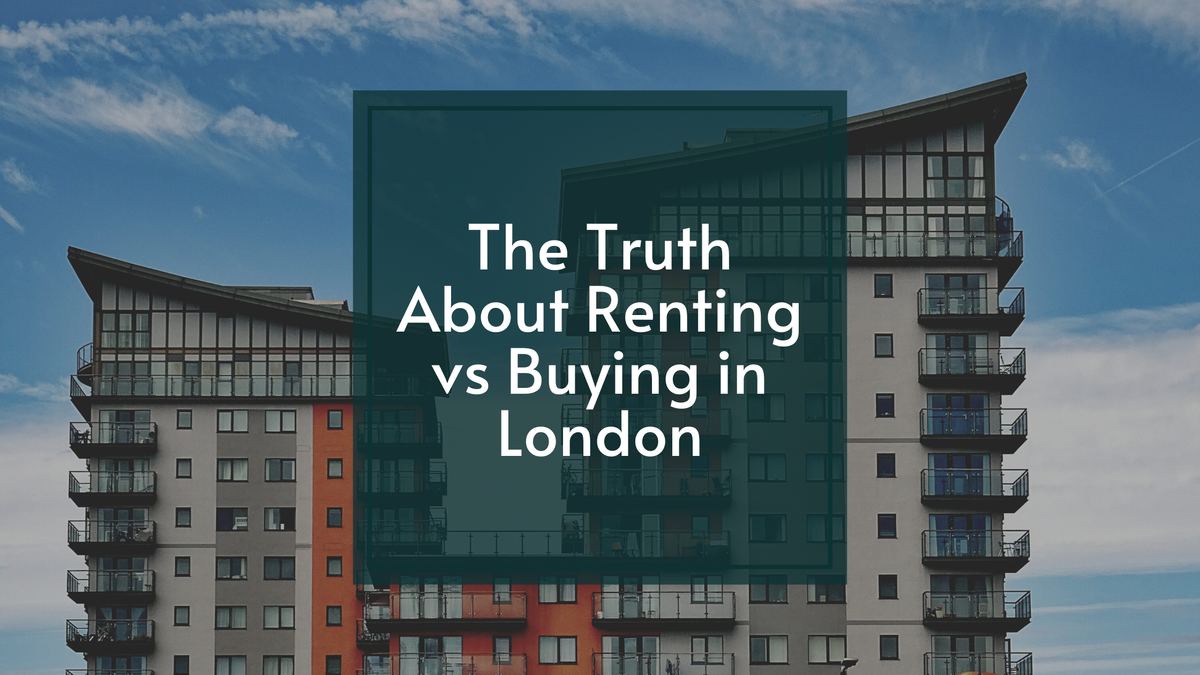The truth about renting vs buying in London 2024
Think renting in London is just throwing money away? Think again.

Think renting in London is just throwing money away? Think again. As a Financial Planner who chooses to rent in the heart of London while owning property elsewhere, I've got a surprising take that could change the way you view the property market in 2024.
In this post, I’ll break down the pros and cons of renting and buying in London.
Prefer to watch? Check out my youtube video instead:

1. Pros of Renting in London
- Flexibility: For people who need to move around for work or lifestyle preferences, renting offers the perfect solution. It allows you to relocate within the city with ease, without the long-term commitment of a mortgage.
- Lower barrier to entry: Compared to the large deposit required to buy a property in London, the financial barrier to start renting is much lower. Typically, you only need a deposit equivalent to about 5-6 weeks' rent, making it a more accessible option for many.
- No maintenance worries: As a renter, you don't have to worry about maintenance costs. In a city like London, where many properties are older, this can save you from unexpected and usually expensive repair bills.
- Access to desirable locations: Renting can provide the opportunity to live in desirable areas that might be too expensive to buy in. This means you can enjoy living in prime locations without the crazy price tag.
2. Cons of Renting in London
- Missing out on property growth: Renters don't benefit from the property value increases that homeowners do. London's property market has historically had quite impressive growth, meaning as a renter, you miss out on this potential financial gain that comes from owning an asset in an appreciating market.
- Market instability: The rental market in London is very competitive, and this can lead to instability for renters. It's common to face rent increases and changes in lease terms, often with little notice. This uncertainty can make long-term financial planning challenging and can cause unexpected disruptions in living arrangements.
- Limited personalisation: Many rental agreements have strict rules against making any significant changes or personalisations to the property. This means you can't always make your rented space feel completely like your own home.
- Dependence on landlord: As a renter, you're at the mercy of the landlord when it comes to property maintenance and other key decisions about the property. Landlords can be unresponsive or reluctant to carry out essential maintenance, leaving you to suffer.
3. Pros of Buying in London
- Investment in a strong market: Buying property in London is usually seen as a smart investment. The city's property market is known for its strong history of value appreciation. By investing in London property, you're likely to build equity over time, as property values tend to increase.
- Stable long-term base: Owning a home in London offers a sense of security and stability, especially in a fast-paced city. As a homeowner, you have complete control over your living space, from decorating to renovating, making it truly yours.
- Potential for rental income: The high demand for rentals in London means owning property here could provide opportunities for generating passive income. You could rent out a part or all of your property, which can be a significant financial benefit, especially in areas with high rental demand.
4. Cons of Buying in London
- High initial costs: Entering the property market in London requires a huge upfront investment. This includes not just the deposit, which can be around 10-20% of the property's value, but also stamp duty and various legal expenses. These costs can make the initial step of buying a property in London almost impossible, especially compared to other regions.
- Ongoing upkeep: Many properties in London, particularly the older ones, often need more maintenance, which can be frequent and costly. Owning a home in such conditions means you'll be responsible for all repair and upkeep costs, which can add up over time.
- Market fluctuations: While the London real estate market is pretty strong, it is not immune to fluctuations in property values. These changes can affect the worth of your investment, which could put pressure on your finances.
- Mortgage vulnerability: With the high property prices in London, mortgages tend to be larger, making homeowners more sensitive to changes in interest rates. This can impact monthly repayments and overall financial planning, especially if there are significant shifts in the interest rate.
5. The reality of successful people renting
Contrary to what many think, owning a home isn't the only sign of success. In London, plenty of successful people rent instead of own. They like the freedom renting gives them, especially in a city that’s always changing. Renting means they can move easily for jobs or personal reasons.
Also, instead of putting all their money into a house, they can invest in different assets, spreading the risk. This can often lead to higher returns than if they just owned a house. The most successful people understand that whilst the roof over your head might make you some money, it should never be considered as an investment.
6. The london perspective
London's housing market is quite special. It's known for very high house prices and a lot of people wanting to rent. This makes the choice between renting and buying a bit tricky. For many, buying a house in London is a big financial step and might not be possible or the best choice. Renting, on the other hand, suits the city's fast-paced life and is often preferred by younger people and those from other countries. It's important to think about how these things match up with your own money situation and what you want from life when deciding whether to rent or buy in London.
7. My personal experience
As a Financial Planner renting in London, I've thought a lot about my living situation. Choosing to rent while owning property elsewhere aligns with specific financial strategies and personal choices. In the last 5 years I’ve not only lived in 4 different areas in London, I also had the opportunity to live in Bali for 6 months.
Should you rent or buy?
Deciding whether to rent or buy in London isn't a simple answer. It really comes down to what fits best with your personal life, financial goals, and how you see your future in this city. Renting offers flexibility and ease, especially in a city that's always on the move, while buying can be a path to building long-term wealth through property. Each choice has its own set of advantages and challenges.
If you're still unsure about what's right for you in London's unique property market, don't hesitate to reach out. You can book a free call with me to discuss your options. Using cashflow modelling, we can visually map out how each choice might affect your finances. This can provide a clearer picture and help guide you towards the decision that aligns best with your life and financial aspirations.
If you're interested in discussing your financial goals and how I can help you achieve them, feel free to schedule a FREE discovery call.
Enjoying my content? Sign up to my FREE newsletter to keep up to date with all my latest posts!
